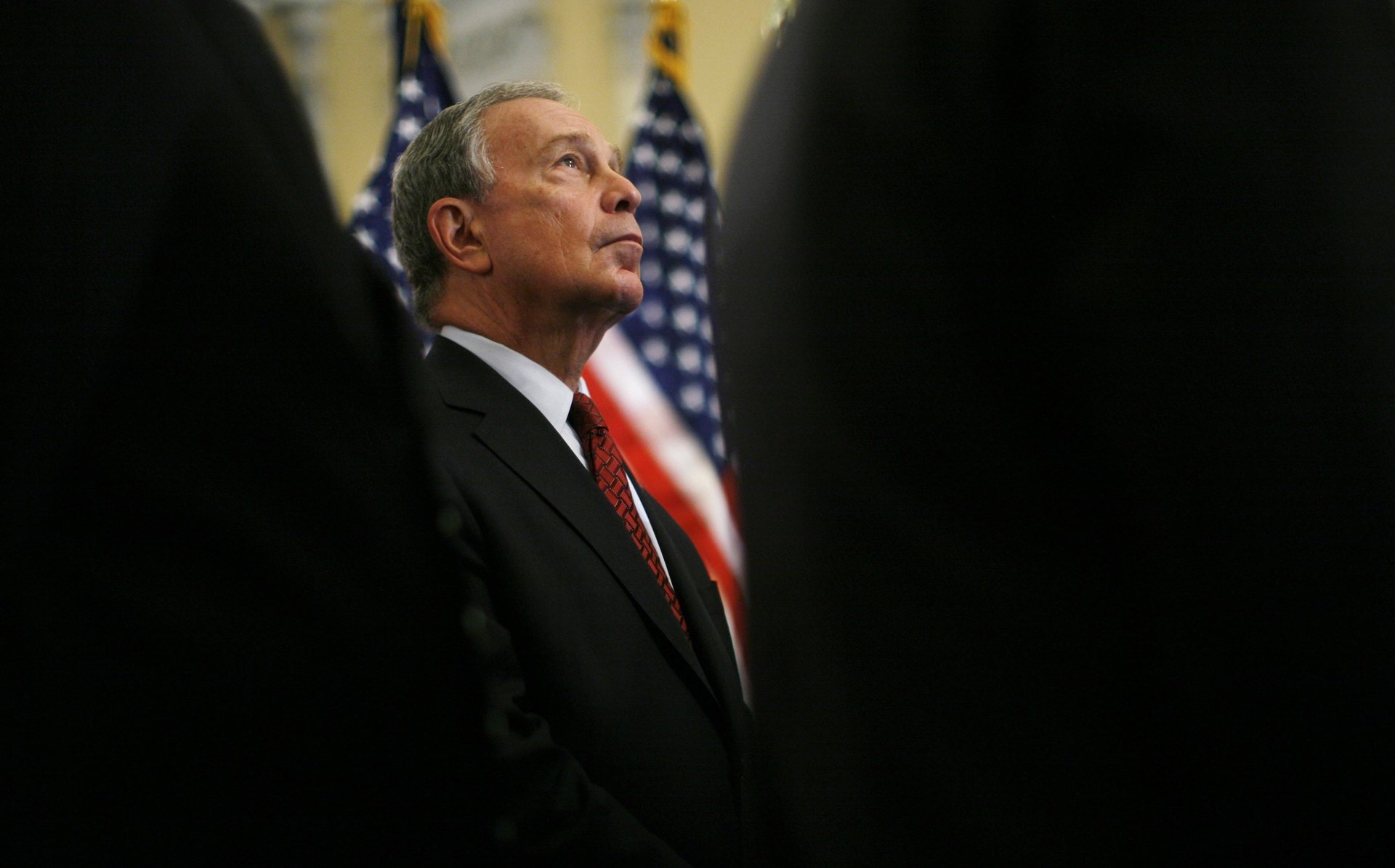Here’s the far-fetched scenario that Mike Bloomberg thinks could take him to the White House
Advisors to Michael Bloomberg insist that his consideration of a campaign for the US presidency is for real—and, somewhat amazingly, that the liberal former mayor of New York could potentially draw on Republican support to win the White House.


Advisors to Michael Bloomberg insist that his consideration of a campaign for the US presidency is for real—and, somewhat amazingly, that the liberal former mayor of New York could potentially draw on Republican support to win the White House.
When his trial balloon went up in the New York Times, commentators immediately noted Bloomberg’s idiosyncratic policy positions and questioned whether this was yet another flirtation designed to massage his vanity. But his advisors say he is encouraged by the rise of outsider candidates like real-estate tycoon Donald Trump and Vermont senator Bernie Sanders, and thinks he has a legitimate shot.
A veteran Bloomberg advisor, who declined to be named discussing the former three-term mayor’s deliberations, told Quartz: “He believes he’d be in a position to be effective if he was a president—he’s an independent, and there aren’t a lot of opportunities for independents to win the presidency.”
If Trump and Sanders go tête-à-tête in the general election, it indeed may leave a sizable chunk of the electorate unspoken for. But that doesn’t necessarily mean Bloomberg has a shot. The deck is heavily stacked against him.
A Morning Consult poll conducted between Jan. 21 and 24 pitted Sanders, Trump, and Bloomberg against each other in a hypothetical three-way race. Predictably, Bloomberg did best among independent voters. But even among independents, he polled at a sorry 25%, below both Trump and Sanders. Include Republican and Democrat voters in the scenario, and he does even worse: 35% for Sanders, 34% for Trump, and 12% for Bloomberg, with 19% undecided.
“Mike is not that well known by most of the electorate,” the advisor concedes, but sees this as an opportunity: “He’s got a hell of a life story, much better and much different than most of the candidates running.”
The former mayor’s political career took place in in the liberal hothouse of New York City, and he officially changed his party affiliation from Republican to independent in 2007. But his advisor told Quartz that he expected Bloomberg to siphon more votes from Republicans than Democrats.
In Bloomberg’s view, Trump has a ceiling among Republican voters, and his nomination might cause some conservatives stay home on election day, or prod centrists to seek out an alternative. A Cruz nomination would leave much of the ideological middle up for grabs. And though a Clinton nomination might make Bloomberg’s path through the middle more difficult, it wouldn’t automatically rule him out.
“If there was great, great support for her, we wouldn’t be having this conversation,” the advisor says.
Bloomberg, backed by some of his $36.5 billion fortune, would sell himself as the candidate of getting things done. His background—a Wall Street bond trader turned financial media magnate, known for the ubiquitous data terminals that bear his name—would be spun as that of a tech company founder.
“The way we would see it is, there are a lot of people out there who don’t like politics,” the advisor says. “If you think that this country is screwed up, want someone who is able to get things done and work pretty much with everyone, then he’s your guy.”
This is essentially Trump’s pitch without the nationalism and offensive punch lines, though with the governing record to back it. But can the pro-gun control, pro-choice, climate change summit-leading mogul win over even moderate Republican voters in this period of conservative populism?
“No conservative will ever vote for Michael Bloomberg,” Jamie Johnson, the Iowa-based former chairman for Texas governor Rick Perry’s 2008 bid for the Republican nomination, told Politico. “He is a liberal. He might be running as an independent. He might have a gob of money that he would like to throw at it, but Americans love their freedom too much to vote for Michael Bloomberg.”
And even if Bloomberg’s policy record is similar to Hillary Clinton’s—socially liberal, cosmopolitan, and consciously capitalist—he lacks her rapport with the key Democratic voting blocs. His record on racially-charged issues like Stop and Frisk did not endear him to minority voters, and his Wall Street connections are much more overt than hers.
Looking at it another way, Bloomberg is a Bernie Sanders for the business set that hasn’t thrown their lot in with either party—he thrills wealthy donors who are convinced that gridlock in Washington comes from bickering parties and a lack of gumption. The fact remains that most independent voters are in fact partisans of one party or another.
But the advisor points out that eighth-richest man in the USA does have one time-tested advantage over the average vanity candidate with a “50/50” shot of entering the race by April.
“I don’t think we would have any trouble getting earned media—you’re on the phone right now,” the advisor says.